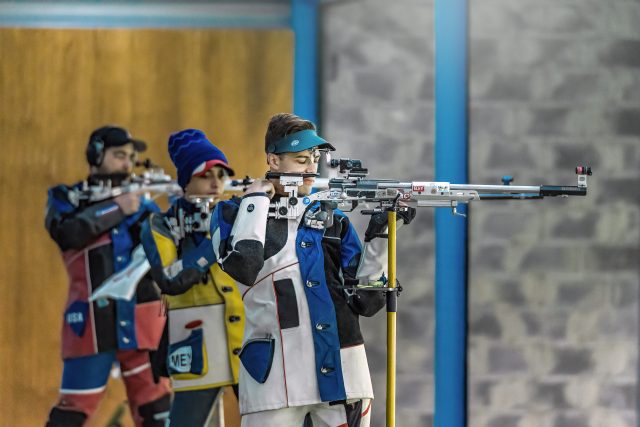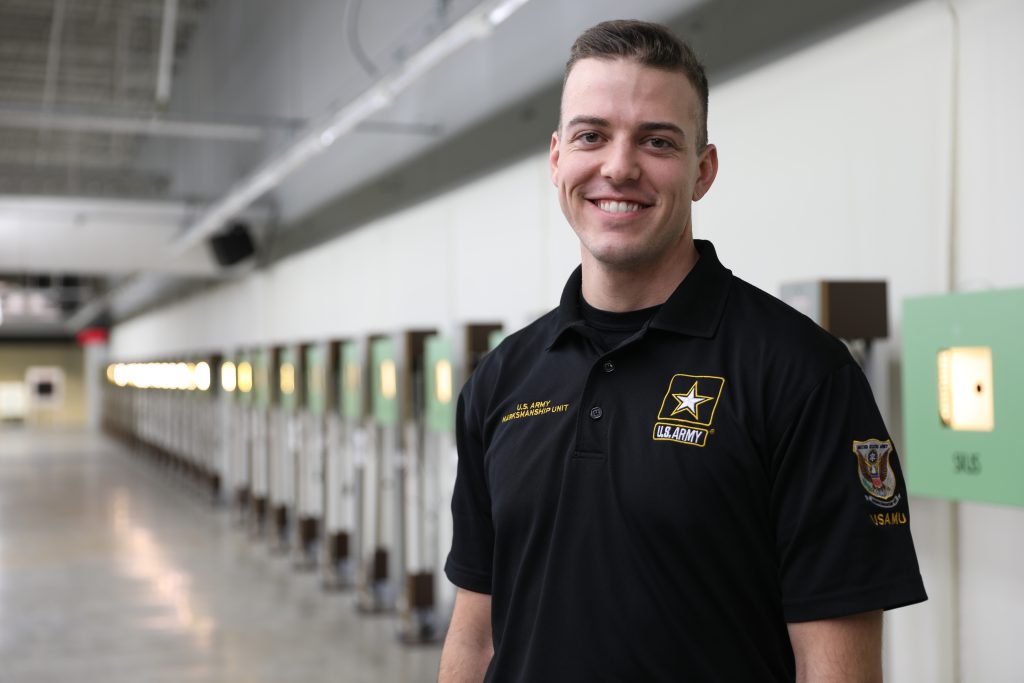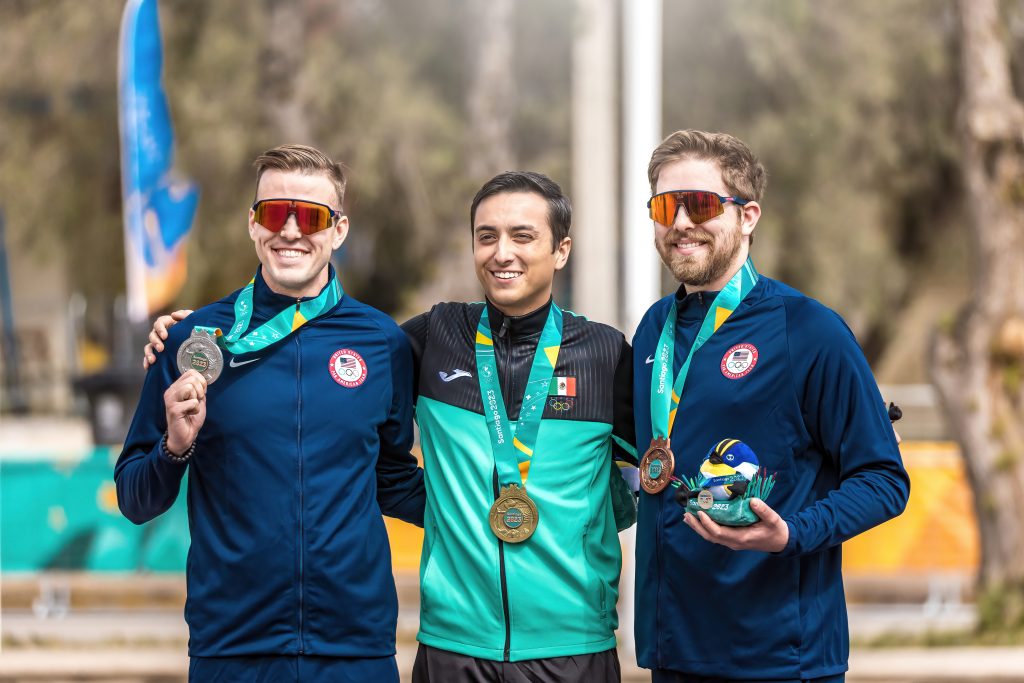
This world is littered with inaccuracy. It rains when the forecast says it won’t. Perfectionists overcook their noodles. Cars are parked too close to the white line. Admittedly, we’ve even missed a few things here at Boulder Weekly. But not Tim Sherry, an elite shooter from Evergreen. For him, precision and consistency are the name of the game.
One of his specialties is an event called the 50 meter Rifle 3 Positions. Picture aiming for a target half a football field away and firing 20 shots from three different positions: kneeling, prone (laying down) and standing. If you hit the bullseye — which has a diameter similar to the width of a pinky finger (10 millimeters) — you get 10 points.
Earlier this year, Sherry set the national record in that event for getting 596 points. Out of 600.
Sherry’s shooting ambitions began in Colorado Springs’ Olympic Training Center before he ever shot a match.
He was just a kid, not even 10 years old, and his dad wanted him to learn basic firearm safety. The shooting range he went to, Cherry Creek Gun Club in southeast Denver, had a competitive junior shooting team and international-style shooting. The coach at the time invited Sherry to watch a competition in Colorado Springs.
At the match, he met a recent NCAA champion, and he also grabbed an autograph from an athlete who took home a gold medal at the Olympics. It was a formative moment for a young Sherry that laid the groundwork for his aspirations to go to college for rifle shooting and compete on the world’s biggest stage.
“That kept me hooked from day one,” Sherry says. “That’s kind of been the path and the motivation ever since then.”
The decorated athlete has achieved many of the lofty aspirations he set for himself after visiting the Olympic Training Center as a kid. This year, he’s coming off two bronze medals at world championships and a silver medal at the Pan American Games. But he’s not quite finished — this winter he has two more Olympic-qualifying competitions to punch his ticket to Paris and compete in the 2024 Summer Olympics.
“Getting to go to the Olympics next summer would be a dream come true,” he says. “I’ve had Olympic aspirations since I first learned about the sport, so it will fulfill a long-time goal of mine.”

A kid from Evergreen
Although he currently lives in Georgia to train with the Army Marksmanship Unit, Sherry still holds strong to his Colorado roots.
“I learned how to skate on Evergreen lake up there,” he says. “That’s a really core memory.”
Sherry misses the tall peaks of the Rockies that he used to frequent, especially with a pair of skis beneath his feet.
“I don’t know how old I was when I first started skiing at Loveland, but I think it was, like, as soon as I could walk,” he says. “My mom wanted to go skiing, so she just dropped us off at their little bunny hill where they had ski lessons, and we were basically at a daycare for the day.”
Even with his love for skiing and the outdoors, shooting was always a priority. He excelled in the sport early on by setting a national record for his age group within six months of picking up a gun.
Moving from a fun hobby to getting serious about the sport as a future was a challenging transition. Sherry couldn’t beat his national record for the next five years and struggled with motivation.
When he was about 15 years old, his coach sat him down to have a “brutally honest” conversation about what it would take to commit to the sport, which likely included spending time away from his family. Sherry knew he had talent in shooting but was on the fence.
“I think having that experience so early on definitely gave me a level of resilience and understanding of what it takes to continue to progress, to find passion in what you’re doing and to really focus on the goals when you’re struggling with motivation,” he says.
In tackling that decision as a teenager, Sherry’s North Star was to be the best in the sport.
“I would get chills down my spine if I had that thought, you know, you’re the best to ever do this or you’re the best in the world,” he says. “That was my motivation and … I built my goals from there.”
Once he made the decision to dedicate his life to the sport, the rest of Sherry’s shooting path — going from college to Army Marksman Unit to Olympic hopeful — was laid ahead of him. While his goals have shifted over time, he is now in a position to make those dreams become reality.
The road to Paris
Sherry says there’s a lot of good competition among his peers on the U.S. national team, but he’s “quietly optimistic” he’ll get a shot at the big stage.
“As long as I continue to be authentic and perform the way I do, and perform consistently, I can come out on top,” he says.
If he makes the cut, Sherry will compete in three events — the 10 meter Air Rifle individual and team, and the 50 meter Rifle 3 Positions.
Along with maintaining consistent physical fitness, Sherry says there’s a strong mental component to shooting and likens it to golfing. To mitigate match-time nerves that can cause a faster heartbeat and shaky muscles that impact shooting accuracy, he has a toolbox of different breathing and visualization strategies.

Credit: Brittany Nelson, USA Shooting
Being fit — both physically and mentally — helps him overcome those challenges. But in a sport with miniscule room for error, it boils down to practice.
“One thing I heard a lot when I was growing up was, ‘It’s not practice makes perfect,’ but, ‘Perfect practice makes perfect,’” he says. “At this point, I’ve stopped believing in perfection, but the idea is still there that you’re trying to train and practice at such a refined level so you can kind of go on autopilot when you get to the competition … you’re not trying to outperform yourself.”
Shooting is more than hitting a target for Sherry. He says he’s learned life skills about being resilient, working toward goals and functioning as a team. The sport has also taken him through college and around the world.
“I’d love for more people to be able to give shooting a try, whether it’s [competitive] or not,” he says. “I think it’d be cool if more people can give it a shot.”














